About our project
The #1 cause of death in America is Heart Disease, followed by another cardiovascular disease, Stroke, the #4 leading cause. These diseases usually strike suddenly, with little warning, and are often lethal and almost always cause some disability. The saddest thing though is that they are almost always preventable with simple changes in diet and lifestyle and / or medications, but most people do not even know when they are at risk. Unless you take a cardiac stress test or an MRI with contrast, most are blissfully unaware that they are in trouble until they feel that chest pain or suddenly pass out from a lack of blood to the brain. But there is a fast and easy test now that can change all this and save millions of lives through prevention.
The Best Test Your Doctor Never heard of: Arterial Stiffness
Originally studied as far back as 1808, “Arterial Stiffness” measures how stiff the arteries have become, otherwise known as “hardening of the arteries” or atherosclerosis. Over the last decade Arterial Stiffness has been found to be great functional test for risk of heart attack and stroke. Specifically, in a study of 2,835 apparently healthy patients it was found to be “an independent predictor of coronary heart disease and stroke in apparently healthy subjects.” In a recent review of 17 such studies covering over 15,000 patients, the conclusion was “Aortic Stiffness is a strong predictor of future Cardiovascular events and all-cause mortality.”
So why don’t doctors use this test?
Well, one existing device that measures Aortic Stiffness involves putting something like a blood pressure cuff around your neck and blowing it up. This option brings strangulation to mind, is expensive and, as you may imagine, can only be administered by a highly trained physician. So no one uses it and most doctors have never even heard of it.
Time for Change
Cre8MDI, staffed by scientists and engineers who love solving problems like this, is poised to fix this problem and help millions Know Their Risk. Our patent pending device is fast, not scary, and as simple as taking a baby’s temperature. This means that every medical office can provide this new test at a reasonable cost and help everyone know their cardiovascular disease risk in an instant. We all know that ‘knowing is half the battle’ and our new device gives immediate knowledge of just how hard your arteries are – something almost anyone can FIX with diet and exercise as well as medications.
There’s an App for that?!?
The Cre8MDI device is a non-invasive wireless sensor technology that measures arterial stiffness by utilizing a method called Pulse Wave Velocity or “PWV”. In addition to measuring arterial stiffness Cre8MDI’s device can display blood pressure and measure cardiac data in real time.
Measuring your PWV is a functional test that shows the current hardness of your arteries. Whereas your cholesterol and other blood tests only show metabolic or dietary information, the PWV shows your actual disease state and risk. The science behind these claims has been demonstrated using tens of thousands of patients from young to old over a span of 30+ years.
Before Cre8MDInow, Primary Care Physicians (PCPs) did not have a simple device that measured arterial stiffness.* Our device will do just that. Our device will not only give new information, but can also replace the traditional blood pressure cuff in every physician’s office and help Doctors and Nurses give more great care at a lower cost. Soon we expect to get the sensor cost low enough so that you’ll be able to monitor some of these parameters yourself right off your smart phone, but for now your doctor can share your results through his EMR’s patient portal or any HIPAA compliant patient-doctor communicator app.
Cre8MDI: The 2 Minute 2 Dollar Test
Our device will take about 2 minutes to administer the PWV test. Low cost, innovative, disposable sensors deter the spread of disease from patient to patient and do not require precision application: just peel and stick. (We don’t know the final cost of the disposable electrodes, but we are projecting they will actually cost less than $2 per test.)
Current devices are expensive, time consuming, inaccurate, require highly trained technicians, and can be downright scary. Few are capable of performing testing on the aorta, the gold standard. This is where Cre8MDI’s market disrupting, patent pending technologies make a difference.
It’s that cheap and that simple. No pressure cuffs around the neck, no specialty probes to hold or tape measures to measure distance.
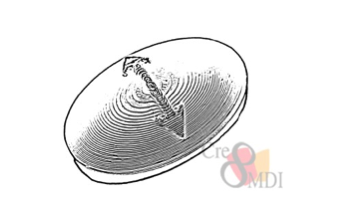
Our sensor is small and holds all the technology inside.
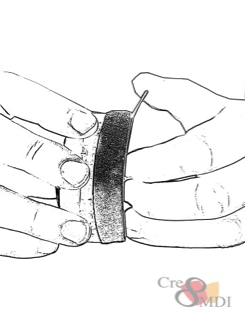
We attach a disposable electrode to the sensor.
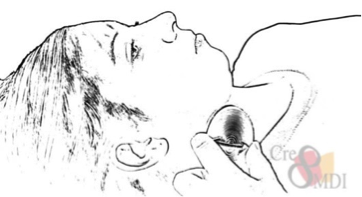
One sensor is placed at the carotid artery.
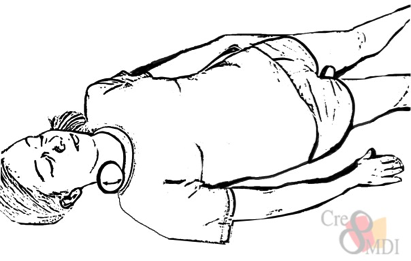
A second sensor is placed on the femoral artery. Aterial stiffness is determined and information is displayed.
How It Works
Cre8MDI utilizes two wireless sensors that are able to analyze the aorta. These sensors attach to the body with disposable electrodes, just like an ECG electrode, and provide the necessary signals to determine the pulse transit time and the distance the pulse is traveling. The resultant arterial stiffness is calculated and displayed to the clinician and patient.
Cre8MDI utilizes a well-known physical relationship between stiffness and the time a pressure pulse travels down the length of a tube. This is commonly referred to as pulse wave velocity or PWV.
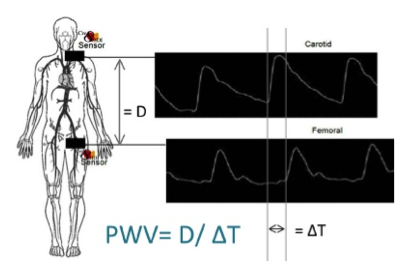
Aortic pulse wave velocity is the gold standard for measuring arterial stiffness just like a mammogram is the gold standard for detecting breast cancer. We think it is time to bring it into practice for everyone.
How We Help Patients
Currently when a patient suffers from symptoms they go to their regular doctor (PCP), who then refers them to a specialist, who in turn sends them for the scans, stress tests, and the like. This results in a series of tests and charges that often reveal nothing except maybe that you shouldn’t eat pepperoni pizza after midnight (heartburn is often mistaken for a sign of heart disease.) What if your doctor could run a quick, inexpensive test that would tell you in 2 minutes if you had healthy arteries? This is the promise of this new technology in healthcare. This is the future of medicine – more, faster, and better at less cost. There is a time and a place for the extensive testing, but routine PWV readings will make sure those tests are done for the millions of people who do need them and not for the millions of people that do not.
How We Help Doctors
Cre8MDIs diagnostic device allows primary care physicians to make a cardiovascular assessment quickly and inexpensively with greater accuracy. Arterial stiffness has been shown to have predictive capabilities for hypertension and various cardiac events. Early detection and accurate monitoring is the key to better wellness. Unlike other diagnostics this takes little time to administer, gives immediate results and requires minimal training to use.
You can train your medical assistants and nurses to administer the test and see the results immediately and have them tracked in your EMR (Electronic Medical Record). PWV testing is an approved test by most insurance companies.
How We Help Hospitals, Institutions, and/ or Medical Facilities:
Cre8MDI’s technology has the potential to replace much more expensive and time consuming diagnostics, allowing you to commit your high value resources to just the right patients. You will be able to give better care at reduced cost, predict with greater accuracy which patients will likely need readmission, and let your highly-trained staff focus on the highest value activities. Arterial stiffness assessments can also be utilized as a pre-surgical test to assess operative risk or better predict outcomes. All these attributes increase the level of healthcare while lowering cost.
How We Help Our Partners
We look forward to working with partners to sell, and distribute our technologies. While our company is composed of world class engineers and scientists, our experience in the field has been that the specialized aspects of marketing and moving our inventions is best left to the existing successful channels. Starting a partnership with us is very easy on MedStartr, just look to the right and select one of the partner offers here or call us to make arrangements for another approach.
We are actively looking for additional beta test sites, clinical study partners and distributors ready to lock in this opportunity now. We look forward to connecting with you!
Current Stage of Development
We have designed and constructed proof of concept prototypes which prove data acquisition and automation techniques.

Our device measures aortic arterial stiffness using a method called pulse wave velocity (a calculated relationship between waveforms) which requires sensors at two locations, the femoral and the carotid arteries.
Our current prototypes allow us to assess feasibility and understand the problems involved in making the necessary measurements. This is critical in determining the work still needed to be accomplished for our technology to become a complete medical device in 2016. Research on aortic stiffness devices and feedback from our clinical partners at Johns Hopkins University identify the drawbacks of present devices and informs our prototype development work.
Another key improvement is how we measure the distance between sensors. In the current devices on the market this is done manually with a documented error range from 10% to 30%, potentially invalidating any data collected or providing false negatives or positives and ultimately the wrong diagnosis and treatment. Our prototype automates this process and uses the value in calculations that are have an eeor range of about 3% in adults.
FDA Status
Cre8MDI’s diagnostic device is classified by the FDA as a Class II device and therefore requires FDA clearance to be marketed in the US. Upon completion of the first pilot run of completed devices, we will be proving equivalence to at least one already marketed device and filing a 510(k) application. We will also be pursuing additional clearance internationally.
Clinical Proof to date
There exists a large body of evidence that PWV and Aortic Stiffness are important metric to determine cardiovascular health risk. Please see the below summaries for your further reading.
“Our findings support the notion that vascular stiffness is a precursor rather than the result of hypertension.”
Aortic Stiffness, Blood Pressure Progression, and Incident Hypertension read more Journal of the American Medical Association, September 5, 2012—Vol 308, No. 9; 875-871
“Aortic stiffness expressed as aortic PWV is a strong predictor of future CV events and all-cause mortality.”
Prediction of Cardiovascular Events and All-Cause Mortality with Arterial Stiffness: A Systematic Review and Meta-Analysis"read more":http://www.ncbi.nlm.nih.gov/pubmed/20338492 Journal of the American College of Cardiology; 2010; 55(13):1318-1327
“PWV was significantly associated with all-cause and cardiovascular mortality, independent of previous cardiovascular diseases, age, and diabetes. By contrast, pulse pressure was not significantly and independently associated to mortality. This study provides the first direct evidence that aortic stiffness is an independent predictor of all-cause and cardiovascular mortality in patients with essential hypertension.”
Aortic Stiffness is an Independent Predictor of All-Cause and Cardiovascular Mortality in Hypertensive Patients read more Hypertension; 2001; 37(5):1236-1241
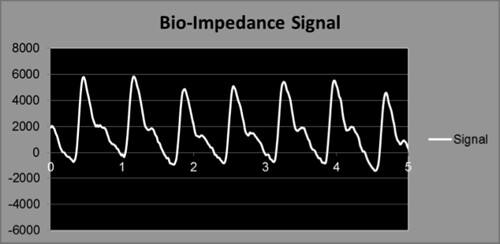
Why Support Cre8MDI
Over the past 2 years we have created a number of prototypes. Thanks to our small group of angel investors we have been able to prove and protect our technology. With four utility patents filed and several more provisional patents in process on these exciting new technologies, our IP strategy is well under way as well.
The funds raised by this campaign will go toward the construction of our next stage prototype. We are excited about the opportunities ahead and hope you’ll support our team in this endeavor!
In addition to access to the system once it is ready (subject to success in development and additional fund raising), we also are offering T-Shirts that will help us spread the word. Please get them and wear them and tell everyone about us!
Our Everyone has a Heart T-Shirt design
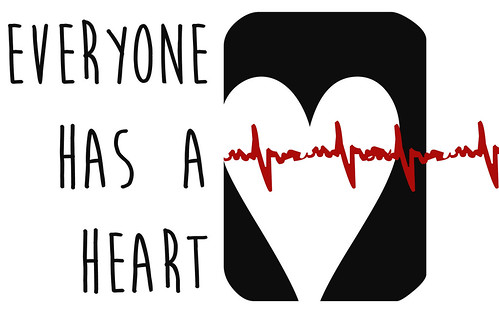
Our beautiful jewelry rewards for supporting Cre8MDI
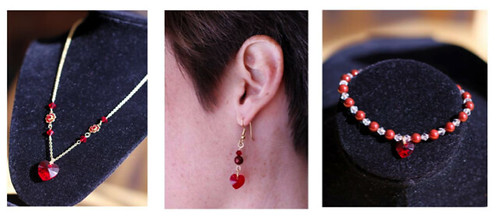
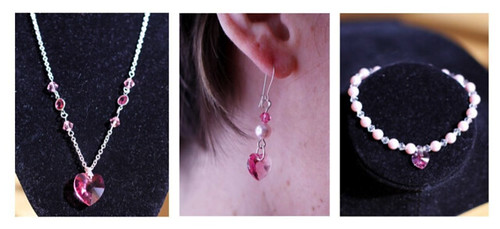
Polar Loop Fitness Tracker
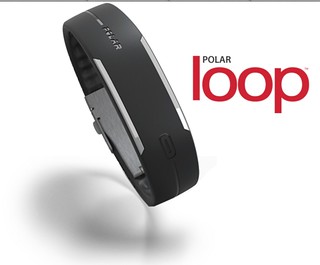
Boston City Pass
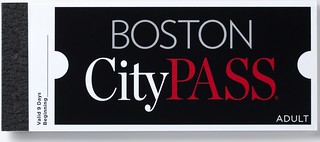
Details here
Who We Are
Cre8MDI’s team is experienced in medical product development, regulatory and manufacturing, both in the US and abroad, and has successful start-up experience.
Founders: David Cassidy
David Cassidy President and founder of Cre8MDI, LLC, a medical device, start-up company.

Cre8MDI’s mission is to develop and commercialize innovative diagnostic devices that will improve the quality of healthcare and reduce cost through early detection of disease. This echoes David’s lifelong commitment to helping others. David has more than 25 years’ experience in the medical device industry including heart assist and IV infusion devices and systems. He has taken a number of medical devices from concept through production and has authored multiple patents.
David’s most recent success comes as co-founder and inventor for Enginivity LLC, where he created and brought to production a sophisticated, mobile IV fluid warmer called enFlow™. Enginivity LLC was sold 3-1/2 years after the product’s inception to Vital Signs, a GE Healthcare company.
Medical partnership: Johns Hopkins University Hospital, Cardiology Dept.
Chief Medical Advisor: Dr Slava Barodka
How to Find Us:
Twitter: @cre8mdi
#cre8forhealth
Facebook
www.cre8mdi.com
Recent Press
In September 2013, David Cassidy was invited to participate in the Third Annual Arterial Stiffness Conference held by the NHLBI (National Heart Lung Blood Institute) in Washington DC. The conference was used as a time for leading grantee doctors and scientists to share their research with each other and the NHLBI.
David presented the status of current arterial stiffness assessment devices and technologies exposing their well-known limitations. He then went on to introduce Cre8MDI’s overwhelmingly simplistic approach. David’s presentation was met with much interest and enthusiasm.
This was a great honor with Cre8MDI being the only commercial entity invited. *NHLBI has identified Cre8MDI as a possible bridge from the scientific community to clinical use. *
Supporting Evidence
1. Kaess BM, Rong J, Larson MG, Hamburg NM, Vita JA, Levy D, et al. Aortic Stiffness, Blood Pressure Progression, and Incident Hypertension read more Sep 07,2012. Journal of the American Medical Association[serial online] 2012 Sep 5; 308(9):875-81.
Summary: Aortic stiffness is “associated with future systolic blood pressure, pulse pressure, and incident hypertension. Our findings support the notion that vascular stiffness is a precursor rather than the result of hypertension.”
2. Laskey W, Siddiqi S, Wells C, Lueker R. Improvement in Arterial Stiffness Following Cardiac Rehabilitation. read more International Journal of Cardiology 2012 Jul 13
Summary: In a group of intensively treated patients with advanced coronary heart disease, “arterial PWV was noted to significantly decrease over 20 weeks of a cardiac rehabilitation program. This change occurred in the absence of detectable changes in peripheral blood pressure or heart rate.” “Changes in PWV may serve as a sensitive measure of altered arterial stiffness in patients with advanced atherosclerotic arterial disease despite ongoing medical therapy. The improvement in PWV was linked to the number of cardiac rehabilitation sessions attended.”
3. Steppan J, Barodka V, Berkowitz DE, Nyhan D. Vascular Stiffness and Increased Pulse Pressure in the Aging Cardiovascular System. read more
Cardiology Research & Practice 2011; 2011:263585
Summary: Aging leads to many changes in the cardiovascular system, and (vascular stiffness) is a powerful predictor of adverse cardiovascular events. “Although systolic blood pressure and pulse pressure are surrogates for this process, vascular stiffness can be measured more precisely utilizing pulse wave velocity. Vascular stiffness, an index of vascular health, has been shown to confer additional independent predictive value for adverse cardiovascular outcomes.”
4. Mitchell GF, Hwang SJ, Vasan RS, Larson MG, Pencina MJ, Hamburg NM, et al. Arterial Stiffness and Cardiovascular Events: the Framingham Heart Study. read more Circulation 2010 Feb 2; 121(4):505-11
Summary: Higher aortic stiffness assessed by PWV is associated with increased risk for a first cardiovascular event. Aortic PWV improves risk prediction when added to standard risk factors and may represent a valuable biomarker of cardio-vascular risk in the community.
5. Mancia G, DeBacker G, Dominiczak A, et al 2007 Guidelines for the Management of Arterial Hypertension The Task Force for the Management of Arterial Hypertension of the European Society of Hypertension (ESH) and of the European Society of Cardiology (ESC) European Heart Journal read more 2007; 28, 1462-1536 2
Summary: Page 1469 (8) Table 4 identifies Arterial Stiffness (PWV) as a high predictive value, very low availability to patients and slightly lower than normal cost in 2007. Page 1474 (13) Box 6 recommends PWV as a test in hypertensive patients.
6. Khoshdel AR, Carney SL, Nair BR, Gillies A. Better Management of Cardiovascular Diseases by Pulse Wave Velocity: Combining Clinical Practice with Clinical Research Using Evidence-Based Medicine. read more Clinical Medicine & Research 2007 Mar; 5(1):45-52.
Summary: Measurement of aortic PWV is an established measurement of vascular damage, as well as a useful methodology to evaluate treatment benefits. Previous studies have allowed the development of a useful calculation of risk.
7. Blacher J, Safar ME. Large-Artery Stiffness, Hypertension and Cardiovascular Risk in Older Patients. Nature Clinical Practice read more
Cardiovascular Medicine 2005 Sep; 2(9):450-5
Summary: The measurement of arterial stiffness is clinically relevant not only for risk assessment but also to quantify reductions in cardiovascular risk.
8. Cruickshank K, Riste L, Anderson SG, Wright JS, Dunn G, Gosling RG. Aortic Pulse-Wave Velocity and Its Relationship to Mortality in Diabetes and Glucose Intolerance: an Integrated Index of Vascular Function? read more Circulation 2002 Oct 15; 06(16):2085-90
Summary: PWV is a powerful independent predictor of later mortality across the entire spectrum of glucose tolerance, with or without overt type 2 diabetes. Because PWV measurement is simple and relatively inexpensive, PWV may become a useful clinical method for assessing vascular and general risk of mortality.
9. Blacher J, Asmar R, Djane S, London GM, Safar ME. Aortic Pulse Wave Velocity as a Marker of Cardiovascular Risk in Hypertensive Patients. read more
Hypertension 1999 May; 33(5):1111-7.
Summary: Increased aortic PWV was strongly associated with the presence of atherosclerosis alterations and was even a strong predictor of cardiovascular risk. These results could have important clinical implications in risk assessment strategies.
Thank you for your interest in supporting Cre8MDI!
Yours Truly,
David Cassidy and the Cre8MDI Team
- Have a question? If the info above does not help, you can ask the project creator directly.
Rewards
For $5 or more
0 Supporter(s)
Thank you for supporting Cre8MDI as we strive to create a device that will predict, diagnose, and detect cardiovascular disease with ease! Your name will be mentioned in a shout out on twitter (#medstartr, #cre8mdi, #cre8forhealth) and on our facebook page! THANK YOU!
For $25 or more
3 Supporter(s)
All of the above AND you will receive a cool “Everyone Has a Heart" t-shirt! Show the world you care about cardiovascular health and tell them about the latest technology at Cre8MDI.
For $100 or more
2 Supporter(s)
Thank you for your support! All of the above AND a handmande Heart Inspired Jewelry Set, (a gift for you or a loved one) in your choice of red or pink.
For $500 or more
2 Supporter(s) Limited (3 left of 5 )
You'll receive a POLAR activity tracker wristband (valued at $109.99) and a cool “EVERYONE HAS A HEART” T-Shirt, plus shout outs on social media!
For $1250 or more
1 Supporter(s) Limited (2 left of 3 )
Join us in historic Boston, Massachusetts for our product release celebration! You'll receive 2 Boston City Passes which includes admission to 5 of Boston’s most popular museums, 2 tickets aboard the famous Boston “DUCKS”, and a gift certificate for $100 to one of Boston’s most popular restaurants, Legal Seafood. This is a trip you will not forget! (valued at $300) You will receive two “Everyone Has a Heart” t-shirts to wear around town.
For $2500 or more
0 Supporter(s) Limited (5 left of 5 )
Be the first to purchase our device (when available) for only $10(!) and we'll also include one case of disposables and you will receive 5 “EVERYONE HAS A HEART” T Shirts for you and your colleagues! We thank you for supporting Cre8MDI as we strive to create a device that will predict, diagnose, and detect cardiovascular disease with ease!
For $25000 or more
0 Supporter(s) Limited (1 left of 1 )
HOSPITALS/DOCTORS: You will be granted early access to our device. Up to 6 units installed in your practice and networked with your office/hospital data system. Two cases of disposables per unit also included. (Only in the Continental US)
No updates found .
No comments found .
Login to post your comment! Click here to Login
backed on 05/07/2014
backed on 05/06/2014

backed on 05/06/2014
backed on 04/15/2014
backed on 04/11/2014
backed on 04/10/2014
backed on 04/10/2014
backed on 04/04/2014
backed on 04/04/2014
backed on 04/01/2014
backed on 04/01/2014
backed on 04/01/2014
backed on 03/27/2014
backed on 03/21/2014


